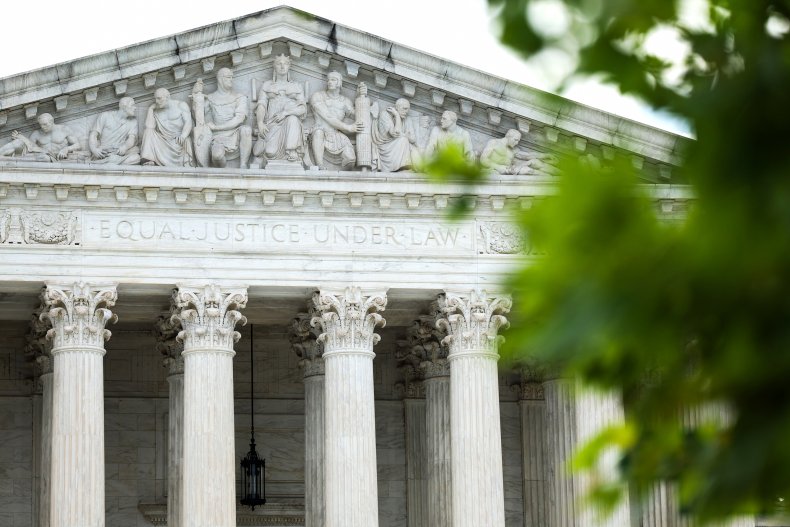A redrawn map of Alabama voting districts in the aftermath of a Supreme Court decision does not satisfy requirements ordered by the court as part of its June decision, and one state representative told Newsweek he's "frustrated."
Chief Justice John Roberts and Justice Brett Kavanaugh joined the court's liberal members on the case Allen v. Milligan, which affirmed a lower court's decision that the Alabama Republicans' map violated the 1965 Voting Rights Act.
The ruling ordered Alabama lawmakers to redraw congressional districts due to a lack of Black political representation, as the map still adheres to having one majority-Black district among the seven even as over a quarter of the state's population is Black.
A map was approved on Monday by the Alabama Permanent Legislative Committee on Reapportionment in a 14-6 party-line vote to be brought forward to other members of the Alabama legislature in a special session for debate.

However, it does not include two majority-Black districts as stated in the Supreme Court's decision.
Alabama State Representative Chris England tweeted a photo of the map and the percentage breakdown by race per district, with only District Seven showing a majority (51 percent) among Black citizens aged 18 years and older.
England told Newsweek via phone that he is "as frustrated about the process that created the map as much as I am of the map itself."
He alluded to a lack of transparency and an unwillingness by some to be cognizant of the time crunch, as maps can be introduced and debated all week but must be passed by Friday with the approval of a federal court.
Community of Interest Plan pic.twitter.com/xNQWqrt44I
— Chris England (@RepEngland70) July 14, 2023
But after two public hearings and different maps being vetted, England said the map that passed in committee was not vetted, is not currently online for public viewing, and it doesn't satisfy the Supreme Court's requirements.
"If we were trying to figure out a way to do this wrong, we couldn't have found another way to do it like this," he said.
Michael Kang, a law professor at Northwestern University, told Newsweek that he doesn't "think there's any doubt that the Voting Rights Act as currently construed requires a second majority-minority district in Alabama," based on district and Supreme Court rulings.
"I expect federal courts to insist on a second majority-minority district if Alabama defies the Milligan decision," Kang said. "I couldn't say for sure, but Alabama Republicans may be calculating on delay from further litigation and, perhaps as a result, running the 2024 elections before being forced to comply."
District Seven is represented in Congress by Democratic Representative Terri Sewell, who cheered the Supreme Court's decision but previously wrote in a Newsweek op-ed that more work remains, such as Congress passing the Freedom to Vote Act and the John R. Lewis Voting Rights Advancement Act to restore the Voting Rights Act.
Newsweek reached out to Sewell via email for comment.
"Republicans in Alabama had a choice between complying with the court's order and being allowed to redraw the map or ignoring the court's order and having the court do the redraw," tweeted Marc Elias, attorney and founder of the Democracy Docket Twitter account.
"So far, they are choosing the second option."
Republicans in Alabama had a choice between complying with the court's order and being allowed to redraw the map or ignoring the court's order and having the court do the redraw.
— Marc E. Elias (@marceelias) July 17, 2023
So far, they are choosing the second option. https://t.co/RprNQx0K99
Republican State Representative Chris Pringle, who serves as co-chairman of the state redistricting committee, said during the session that the new plan increases the second congressional district's Black voting age population from 31.86 percent to 42.45 percent, according to local media outlet 1819 News.
"As it was said earlier in this committee, there are districts that can be drawn that may not be majority (Black voting age population), but the performance analysis will prove that they can elect Democrats or Republicans," Pringle said. "They're opportunity districts."
One of his Democratic counterparts, Rodger Smitherman, said that gerrymandering is part of these ongoing discussions.
"I see that we have a considerable amount of gerrymandering going into areas to provide the necessary population in terms of African-American or sheer numbers in terms of the makeup of those districts," he said. "I'm seriously concerned about that."
England said he understands statewide Republicans' concern for potentially losing congressional seats, but also is wary of the GOP members' numbers as it pertains to African Americans electing their candidate of choice.
Numbers on paper could show a 49 percent Black district, he added, but the district could potentially vote in the complete opposite manner for different candidates.
"You've got to be able to demonstrate that whatever district you're representing, the number creates a realistic opportunity for African Americans to elect a candidate of choice," England said, rather than a map coming out of committee and passing on racial and party lines.
Update 7/18/23, 9:50 a.m. ET: This story was updated with comment from Michael Kang.








